I thought that it was proper and fitting to evaluate the state of affairs in Iraq four years after President Bush declared the end of major military combat operations in Iraq.
First, regarding casualties, one finds that the current pace of fatalities exceeds by far the trend rate over the March 2003-February 2007 period (red). Indeed, the pace through April exceeds even the February 2006-February 2007 trend (green). To some extent, one might expect this to occur (as I noted earlier) since there is a higher concentration of US troops, and many of those troops are now more active and more exposed to combat and attacks by way of IEDs.
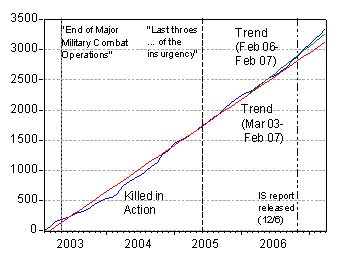
Figure 1: Cumulative fatalities in Iraqi theater of operations, through April 30 (blue), and trends based on entire sample up to February 2007 (red), and 2006M02-07M02 (green). Source: Iraq Coalition Casualty Count accessed on 30 April 2007.
This graph indicates approximately 463 fatalities have been incurred since the release of the Iraq Study Group’s report in early December 2006. Nonfatal casualties are not yet reported for April; cumulative nonfatal casualties through March are on track to match the trend recorded for the February 2006-February 2007 period. By end-March, there had been approximately 2267 additional nonfatal casualties since the release of the ISG report.
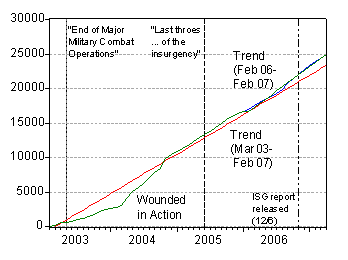
Figure 2: Cumulative nonfatal casualties in Iraqi theater of operations, through April 30 (blue), and trends based on entire sample up to February 2007 (red), and 2006M02-07M02 (green). Source: Iraq Coalition Casualty Count accessed on 30 April 2007.
With the on-going escalation, US troop levels in-theater have increased substantially. However, as non-US coalition forces have decreased over time, total coalition force levels at 159,000 have only re-attained their November 2006 values, and remain substantially below peak levels in November-December 2005 (at 183,000). In addition, they also remain far, far below those figures former Army Chief of Staff Eric Shinseki indicated would be needed to stabilize Iraq (see [1]).
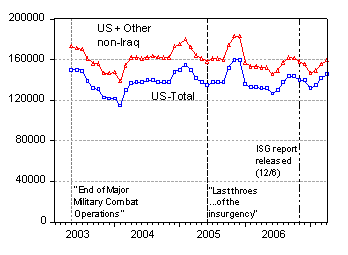
Figure 3: US (blue) and total non-Iraqi coalition (red) force levels. Source: Brookings Institution Iraq Index.
The escalation in force levels carries a price tag, of course. There is some question about what the ultimate budgetary fiscal impact will be, especially since the duration of “the surge” has been lengthened in recent discussions. The CBO has released in the past few days an analysis of the budgetary and readiness of implications of this escalation (see [2]. The Administration fleshed out some of the details, and submitted a slightly more realistic appraisal of likely costs in a March 9 revision to its earlier funding request (the earlier estimates of the surge’s cost were difficult to reconcile with basic math; see [3]). This revised request is incorporated into the CRS’s assessment of the Administration’s budgetary requests. Using the information in CRS’s analysis, I have calculated the implied average monthly burn rates, in billions of dollars per month (bdpm).

Figure 4: Monthly burn rate for Iraq Theater of Operations, in billions of dollars per month (bdpm), by fiscal year (blue line). Source: For FY2003-08, Amy Belasco, “The Cost of Iraq, Afghanistan, and Other Global
War on Terror Operations Since 9/11,” Congressional Research Service Report RL33110, March 14, 2007, Table 1. Baseline (green), from September 2006 CRS report. For FY 2007-08 “Hi” estimate (red), author’s calculations based upon reported figures (see this post).
My estimate from December (red) matches pretty closely the most recent CRS estimate of the monthly burn rate for FY’07. (Note FY’08 figures assume there is no revision to the amount necessary for “the surge”, an assumption that seems to me somewhat dubious.)
Those who view the Iraq venture as a success — or potential success — often argue that other indicators should be recounted. Hence, I add in one important measure of reconstruction, namely the average electricity production nationwide. (Other indicators are examined in the SIGIR’s report; see [4], as well as the website.)
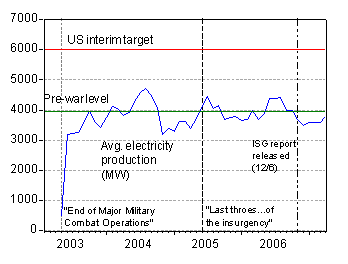
Figure 5: Average electicity generation, nationwide, in MW. Source: Brookings Institution Iraq Index.
While electricity production lags far below the US interim target of 6000 MW (to have been reached by July 1, 2004), it is not far below the pre-war level. So certainly there has been some success. On the other hand, if one focuses on electricity provision in Baghdad, the focus of current efforts, then the picture is not so rosy.
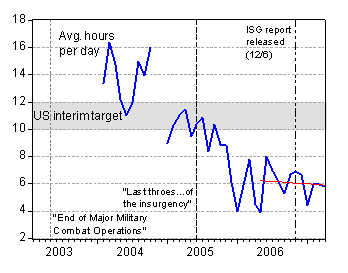
Figure 6: Average hours of electricity supply, in hours per day (blue). 2006M05-07M04 trend (red). Source: Brookings Institution Iraq Index and author’s calculations.
Since there are no figures for electricity production for Baghdad proper, I have reported the hours/day figure. This series is now substantially below the US interim target of 10-12 hours/day. Now, to be fair, hours/day production is higher in the country overall, at 11.7 hours, solidly in the middle of the US interim target, and far above the pre-war level of 4-8 hours. But to the extent that securing Baghdad is critical, one must pay attention to trends there (the red line depicts the one-year trend, which has a negative slope).
If the Administration’s budget request (as amended in March) were fulfilled, then cumulative expenditures in Iraq (excluding many Reset costs and implied VA costs) would sum to $564 billion. That figure also — obviously — excludes opportunity costs associated with deferring and/or stretching out other military procurement programs (see [5]).
Technorati Tags: Iraq, casualties,
force levels,the surge, burn rates, electricity generation, “Mission Accomplished”.
Summary: Even if every single economic stereotype wrt Republicans vs. Democrats were true, the cost of this war would render it all moot.
Kash has a note about our incapacity to deal with the magnitude of this huge number…which brings to mind astronomers (and scientists in general) and the use of numbers: calculation to inform decisions.
By the time the humongous number reaches the lay person, it has lost some, if not all, its significance.
We could, and do, make comparisons to other military adventures, other more current costs (eg Katrina), but not often in the media, not Fox or CNN.
No sense encouraging a crowd that is already unhappy seems to be the m.o. of the still very Bush-friendly media…despite a recent election that this same media articulated as an anti-Iraq vote.
Professor Hamilton,
Such are the costs of colonial wars.
For what it’s worth I’m currently reading ‘The Collapse of British Power’ by Correlli Barnett. I would recommend it to all your readers.
Wrong Professor, Martin. Professor Hamilton spares us the labored war ‘progress’/cost posts.
Colonialism, no; misplaced idealism (force democracy upon Iraq and hope that it takes root, grows, and displaces the wretched conditions and horrible regimes in the Arab Middle East and Persia that give rise to radical Islam), yes.
jg: I do wonder how much idealism was embodied in the Administration’s swift embrace of military action. Would it have been so eager if Iraq had no oil reserves?
Professor Chinn,
Firstly, my apologies. As JG notes, wrong professor.
As far as idealism was concerned, as Mae West might have put it idealism had nothing to do with it.
It is hard to believe – impossible to believe – that anyone with a shred of history in their locker would have felt that the sort of (I’ll not the use the word ‘crusade’) evangelical rush to democratise a part of the world whose social and cultural structures seem incapable of supporting democracy was not doomed to failure.
The only thing that country had going for it as a target was
1. Its history of ignoring the diktats of the so called ‘international community’; and
2. Its oil.
That’s all.
As Calmo mentioned, Kash makes a valiant effort at helping us understand how expensive this war is:
A Lot of Money.
I’m not sure that it quite succeeds, but it’s worth a read.
Dr. Chinn, perhaps you imagined things would be over quickly but I did not. After war, comes occupation. After occupation and financial support comes military support for security purposes. It may extend for decades if the region is volatile making the weaning process seem painfully slow.
A war may take mere days to settle, as history has shown often happens, but recreation of a stable local government can take generations. This nation broke the Iraqi government, however hateful and corrupt it was. So are we responsible for restoring it to autonomy, or should we just get out and leave them to their own devices?
As a citizen of the USA, I recognize I am partially responsible for the political actions of my elected representatives, whatever those actions may be. Whether the President screwed up, or made an insightful, if unappealing, decision, how am I not still partially responsible for any fall-out?
The cost, as you’ve pointed out, is very real. Many, perhaps most, balk at paying when it comes due month after month. To me, the whole issue isn’t about what mistakes, in hindsight, have been made on our behalf. It is about responsibility for financial and moral debts.
Moral debts…a new hybrid for me Anchoku, but I am stunned that you feel partially responsible for the political actions of our elected representatives especially the official that vetos the bill funding this madness because it has withdrawal dates attached to it.
If only The President could respond to the recent election where “the people [had] spoken” (but w has such a poor memory?) or an even larger number according to recent polls…following your example: being responsible to the electorate.
You knock me out: Imagine feeling responsible for this administration’s follies as they loot the citizens and plunge America’s international reputation into the toilet…are you a Buddhist?
Professor, no oil is required for idealistic preventive/corrective action; only the real, or perceived, threat of resident terrorists, training for follow on 9-11s.
To wit: no oil in Afghanistan.
What can you say? What a mess.
Can anything persuade Bush to end his occupation of Iraq?
What would you anti-war types’ opinion of the Iraq war be if Iraq were as pacified as, say, Afghanistan? Or do you all think that we need to withdraw from there as well?
Buzzcut and jg I don’t believe I made any mention of Afghanistan in the context of the idealism issue. Indeed, if you read my posts, I don’t believe you’ll find an anti-war or anti-defense spending stance. I am against incompetence, and I am against the unnecessary waste of resources and lives. Shouldn’t we all be so inclined?
MC — great final point.
It is really hard to get most people to understand
that being against the war and being against losing the war because of the incompetence of this administration are two very different things.
Menzie, while my question was not really directed at you (more for a couple of your commenters), your reply does generate a new question.
Let’s just say that you did your analysis for Afghanistan, and you came up with a regression curve. If the Iraq casualties fell on that curve, would your view of Iraq change?
Incompetance is in the eye of the beholder. Has Afghanistan been managed incompetantly? I don’t think so. Yet it is being managed by the same people who “bungled” Iraq.
Iraq is a mess that would challenge even the most competant adminstration possible.
While it is easy to quantify the U.S. costs (dollars and deaths) of the war in Iraq, it is harder to quantify the costs to the Iraqis themselves.
An Iraqi friend of ours has family in Iraq. They talk with a sense of desperation… desperation that when, not if, but when the Americans leave that they will face certain death and the destruction of their society by foreign-funded insurgents.
Their lives were horrible under Hussein and getting rid of him was a great boost temporarily. But it left a vacuum which has been filled by Taliban-like groups from several nations who are anxious to create a new base of power.
The question is not so much whether the Administration is competent or the motives were totally noble. The question is how the west will face a stateless enemy that has no “rules of engagement” held so dear by those who condemn U.S. involvement in Iraq.
Just as communication has changed because of satellites and the Internet, so too has warfare. As long as the military is restricted to WWII conventions, it will have the same chance of success as the WWI French cavalry model did against the German Bliztkrieg in WWII.
There is also the presumption that if the U.S. were to withdraw quickly, that we would see a corresponding reduction of costs. That may be true in the short run, but given the situation that would probably arise from a quick withdrawal, it is likely that long-term costs will be significantly higher than staying and driving out the foreign-financed insurgents.
I find it peculiar that the same people who oppose our involvement in Iraq question why the Administration hasn’t “done something” in Darfur. Apparently, some involvements are more “noble” than others.
“What would you anti-war types’ opinion of the Iraq war be if Iraq were as pacified as, say, Afghanistan? Or do you all think that we need to withdraw from there as well?”
Since Afghanistan harbored the guys who actually attacked us, I’d support a much larger troop commitment than we have now. In fact, had we not wasted so much blood and treasure on Iraq, we might have been able to construct something approaching the rule of law in Afghanistan, a far more practical and ethical goal.
Bruce Hall: I agree that one should take a present discounted value assessment of costs versus benefits. That is, we should weight the benefits of reducing our military commitment in Iraq against the costs, over time. But then, one can ask, will the dominoes fall (I seem to remember Cambodia, Thailand, Malaysia and so on were all to collapse in the wake of a US withdrawal from Vietnam) as you conjecture, leading to greater costs and a return to further intervention in the future? I’m dubious of the proposition the benefits exceed costs for the current course, especially when it is not clear that we are eliminating insurgents faster than we are creating them, when we are depreciating our military assets faster than we are replacing them, and when we are constrained in our actions in other spheres by virtue of being mired in Iraq.
One last query: Given the United States’ own assessments of the strength of foreign insurgents as not the major source of US casualties, do you truly believe that getting rid of foreign-financed insurgents in Iraq would be sufficient to stabilize Iraq, given current US force levels? And if so, how long would US forces need to remain in Iraq? I think this question is germane to the issue, since we are currently expending approximately $11 billion per month, or $133.6 billion per fiscal year. Then do the present value calculation for the time period you expect our forces to remain in-theater.
buzzcut: Thank you for the clarification. The answer to your question depends upon the relative costs and benefits associated with the trends. However, I will note that on could argue the causality runs the other way; namely that if the US had maintained a sufficient force levels in Afghanistan — rather than diverting them (especially special ops) away to the Iraq adventure — then Afghanistan would now be much more stable. In that regard, I share the sentiments voiced by M1EK.
I think the question is not one of dominoes but rather whether an anarchic state would provide an effective base for international terrorist operations, for which the relevant precedents are not Cambodia or Thailand but rather Somalia and Afghanistan.
Vietnam did set off a run of dominos. Both Laos and Cambodia fell, at the cost of millions of lives.
What will be the cost in lives of US withdrawl from Iraq?
Menzie, your question as to how long can we sustain operations in Iraq at $11B per month is fair. I don’t know how long we can keep this up. You are also correct in your observations about strain on the military, our inability to “take care of business” in other theaters (Iran, North Korea), etc.
But any ledger of benefits is going to be very subjective and contentious. What are the benefits of not having Sadaam defying the UN? What are the benefits of having Iran surrounded by US forces? What are the benefits of conflict between Sunni and Shiites, between Arab and Persian and Kurd? They’re so busy fighting each other that terrorism against the west is secondary.
I’m reading “Heir to the Prophet” now, which concerns the Sunni/ Shiite split. These conflicts go back to the earliest days after Mohammed died.
There are many anarchic states. Pakistan, an ally of the US, can be considered one, though not on the same level as Iraq. As far as providing a base for terrorism, Saudi Arabia should have been considered anarchic.
The underlying issue is not anarchism, but rather widespread ‘irrationality.’ The only lasting solution is to foster rationality everywhere. An islamic fundamentalist talking about his ‘God-given’ right to do ‘jihad’ is the same as Bush saying Jesus Christ is the philosopher he admires most.
So why not begin with the politicians and universities. When a politician speaks of how ‘God’ guides him, society needs to think about chasing him out of office. And people who believe in a God (and worse, Creationism over evolution) should have not be in a position of authority in Universities.
While rationality is not a sufficient condition for a terror-free society, it is certainly necessary. You can’t point out the irrationality of someone else’s position when your own position is equally irrational.
“I am against incompetence, and I am against the unnecessary waste of resources and lives.”
Me, too, Prof. Chinn.
We use kid gloves with the Sunnis in Iraq, who, with al Qaeda, kill to retain/regain power. We should take the kid gloves off in our dealings with the Sunnis.
The analogy that I found compelling (I forgot who wrote it) was that, after the fall of the Afrikaaners in South Africa, who cared about the plight of the remaining Afrikaaners? No one, because they had used ugly means to retain power, though they were a minority. Why should we care about the plight of the Sunnis, who, under Saadam, used ugly means to retain power, though they were a minority?
Let the Iraqi Shias run amok and clean up the mess in their country.
There’s nothing to fear from Shia Iraq cooperating with Shia Iran. Shia Iran will topple over the next decade, from internal reform/revolution/revulsion (from the Mad Mullahs attacking Israel or Saudi Arabia).
President Bush, either fight aggressively, or get the heck out.
While rationality is not a sufficient condition for a terror-free society, it is certainly necessary.
I don’t agree with that at all. Christians in America haven’t beheaded anyone. They haven’t stoned anyone. They haven’t thrown people in a pit and knocked walls down on anyone. Christians don’t use car bombs, or IEDs.
You’ve got nothing to fear from American Christians. Comparing them to Islamists is silly. Apples and oranges.
JDH: I agree that the biggest threat is not dominoes — although that argument has been made. Rather, a “failed state” is a more likely outcome of a rapid, uncontrolled, withdrawal. However, it is clear to me the current strategy (which is the old strategy — only the tactics have changed) is not sufficient to stabilize the country without an indefinitely-lived occupation by US forces. If one believes the American electorate is unlikely to countenence expenditures of $11 billion per month indefinitely, then we should seek a controlled reduction of US force levels that acknowledges that Iraq is unlikely to be viable as an integrated state. In other words, I am not advocating pell-mell withdrawal. Rather, I recognize the fact that the current course is merely “running down the clock” so that the current Administration does not have to admit that they have failed, and passing off the problem to the next Administration, and we need to consider alternative paths..
I think the question is not one of dominoes but rather whether an anarchic state would provide an effective base for international terrorist operations, for which the relevant precedents are not Cambodia or Thailand but rather Somalia and Afghanistan.
Gee, it’s too bad the administration didn’t listen to the many experts that warned that a dangerous anarchy and a training ground for terrorists would be exactly the result before the invasion started.
The real question is how many of our kids are you willing to kill in a pacification mission that is going into its fifth year and with results that only get worse. And the catastrophe is not just localized to Iraq. Our Iraq occupation is breeding thousands more angry jihadists in Syria, Iran, Saudi Arabia, Lebanon, Pakistan and Indonesia, among others. The occupation is not making America safer. It is making is much less safe.
The big winners from our Iraq adventure seems to be Iran (and Hizbolla) and to a lesser extend Syria.
As MC has pointed out: Is the current strategy likely to result in a favorable outcome? AND, when will this happen? (i.e. given the cost, will the “price” be worth it)?
It’s sad that there are only two differences between the surge and what Gen. Shinseki said before the war: The timing, and the amount. The surge is effectively a belated and timid admission that he was right
Whether this was the time to take action in Iraq is irrelevant. It should be realized that what is happening with the Shites vs. the Sunnis probably would have happened eventally if we never invaded and Sadam had died from old age. Whether or not we would have been drawn into that is debatable, but not impossible to fathom.
JG – I agree wholeheartedly that we are not pursuing this aggressively enough. Case in point, after the recent killing of Muharib Abdul-Latif al-Jubouri, described as al-Qaida’s information minister in Iraq, “mourners gathered at al-Jubouri’s house in Duluiyah, 45 miles north of Baghdad, as a huge funeral tent was being erected in the street” (Associated Press). Why was that tent not considered a valid target? Surely those mourners are supporters of Al-Queda and wish us harm. Must we wait until they take a shot at a soldier before taking action?
All of your charts, graphs, and statistics are straight out of the Robert S McNamara’s school of “mananaging” a war. If anything good came out of the Vietnam, War, was Mr. McNamara’s “system managment” was a shown to be a total failure. Mostly, because all the numbers that were gathered, added and subtracted, repoted and analyzed, charted and graphed, had nothing to do with winning or losing the war.
Mission accomplished in 2003 and mission flopped beginning in 2003……..If we have to go into a war, you should at least have a good understanding of your enemy as well as your objectives and goals but I see neither and now Rice even has to bit the bullets starting to talk to Syria as well as Iran. Is it a shame or is it the beginning of the end of the mighty America…..be careful… we are now nurturing a battlefield in the Middle East where you don’t even know are your foes or your allies. As a matter of fact, who are you fighting with in Baghdad and Anbar? are they the Sunnies or the Shites? Either way, it is a dead end because even if you can stabilise the situation in Baghdad now, the G.I.s still have to go one day and when the Americans go, the sectarian strife would immediately be on the agenda for both Sunnies and Shites and there would be no democracy nor even a secular Muslim country and I anticipate a strict Islam state soon once the Americans leave…. Is it bad to have a secular Saddam without WMD or a strict Islam state? Should we sob or should we laugh at the neocons….
Buzzcut,
If you ask many foreigners, they will vigorously disagree that they have nothing to fear from American Christians. While the Islamists still employ beheading and car bombs, our folks find nothing wrong with killing innocents using guided missiles–of course we call that ‘collateral damage’ when it suits us; and what of the lynchings, the crusades of the past, the excesses such as our support for Chile’s Pinochet during the cold war?
To the extent that America and the West can be thought of as more ‘civilized’ than the Middle East, it has to do with the civilizing influences of ‘rational’ thought over religion. When America’s founding fathers made the constitution secular and decided on the separation of church and state, it was made possible by an acceptance of rationality and not by Christianity. But secularism is not an end in itself–it is only a way-station toward eventually creating a more rational society. The acceptance of secularism is in fact an acknowledgement of the absence of an omnipotent, omnipresent God..
If the influence of rationality were to spread worldwide, Islamists would find themselves isolated and eventually fade away. Of course it is no easy task, but militarism and cruise missiles are not a lasting answer to this problem.
My vision is that the US should become a defender of such rationality and employ its power judiciously to spread it. The neoconservative vision of spreading ‘freedom’ devoid of any emphasis on rationality is doomed to fail.
Rationalist-
You may want to refer to your Constitution the first amendment of which reads: “Congress shall make no law respecting an establishment of religion, or prohibiting the free exercise thereof; or abridging the freedom of speech, or of the press; or the right of the people peaceably to assemble, and to petition the Government for a redress of grievances.”
Note no mention of “separation of church and state”, which IIRC was a (mis)-interpretation by a later jurist. Your take on history is a bit biased.
Professor Chinn-
If you don’t believe that the Iraq war has any benefits, then no cost is justified. I suspect that is your position. If you believe the war was justified, which I do, then the costs have to be weighed against the benefits. I believe George Bush and the Congresss were on firm ground when they acted to enforce the surrender agreements that saved Sadaam back during Gulf War I. If they had not acted, Sadaam would still be around, knowing that he had outlasted the UN and flush with the Oil-for-Food money. Would he have aided terrorists by providing them with weaponry? What would stop him, especially since there is little stomach in the West for holding anyone accountable for their actions?
I think the second reason for the war (and more controversial) was that rather than going strictly on defense against terrorists, Bush wanted to change the dynamic in the Middle East. That was and remains a strategic gamble, the results of which will only emerge over time.
Rationalist, obviously I don’t agree. Communists thought that they were being rational. Nazis thought that they were being rational. Ayn Rand was hyper-rational, would you like to live in a world run by Objectivists?
Rationality unhinged from morality has been proven again and again to be a recipe for widespread death and destruction. The Crusades don’t even come close in terms of a body count to “scientific socialism”. Not to mention that the Crusades were a pretty rational response to Muslim expansionism at the time!
Buzzcut,
You make the all too familiar mistake of equating rationality with an absence of morality and religion with morality.
The Nazis and the Communists were not driven by rationality, but rather by racial and ideological hatred, which deprived them of their rationality.
We could keep arguing a lot on that, but I don’t have the time. So I will just stop from making any more comments on this.
Duane: I recommend to you highly the late David Halberstam’s The Best and the Brightest. For me, the lesson of the book is not that one should ignore numbers. Rather: (i) don’t take the numbers out of context; and (ii) don’t allow the agencies collecting the numbers be the sole interpreters of the numbers, otherwise the system will be gamed. A more important lesson is to realize the constraints on power, and the ability of the US to remake other societies. This unfortunately was not one lesson internalized by policymakers in the run-up to the war (see also PoMo policymaking, [1].
Bruce Hall hit the mark:
“The question is not so much whether the Administration is competent or the motives were totally noble. The question is how the west will face a stateless enemy that has no “rules of engagement” held so dear by those who condemn U.S. involvement in Iraq. …
There is also the presumption that if the U.S. were to withdraw quickly, that we would see a corresponding reduction of costs. That may be true in the short run, but given the situation that would probably arise from a quick withdrawal, it is likely that long-term costs will be significantly higher than staying and driving out the foreign-financed insurgents.”
It was also stated that:
“I think the second reason for the war (and more controversial) was that rather than going strictly on defense against terrorists, Bush wanted to change the dynamic in the Middle East. That was and remains a strategic gamble, the results of which will only emerge over time.”
In the post 9/11 environment, we saw that being reactive was not sufficient, and changing the dynamic of Arab governance away from terror-coddling despotism was perhaps the only way to really eliminate the threat of global Jihadist terrorism. Now, after a heavy price being paid, we are being told by some that our involvement was/is both un-necessary, unwinnable, etc.
Yet the war in Iraq is a part of the war on terror, indeed it has always been a part of it. We fight “Al Qaeda in Iraq” and allied terror groups that feed off of AQ propaganda and are seeking the establishment of the kind of states that bin Laden advocates. If they succeed they will be at permanent war with us.
It would be more profitable and useful therefore to consider the question of whether fighting the war on terror post-9/11 was/is necessary and whether the fight is winnable, etc. what has been the cost of the war on terror? Is it worth it? Should we stop fighting the war on terror? Should we perhaps have a withdrawal date on it?